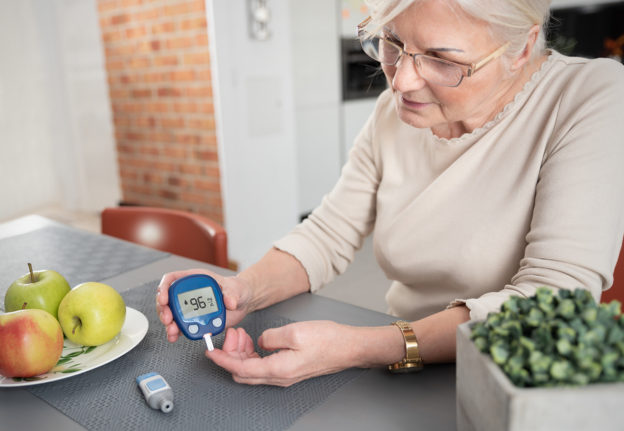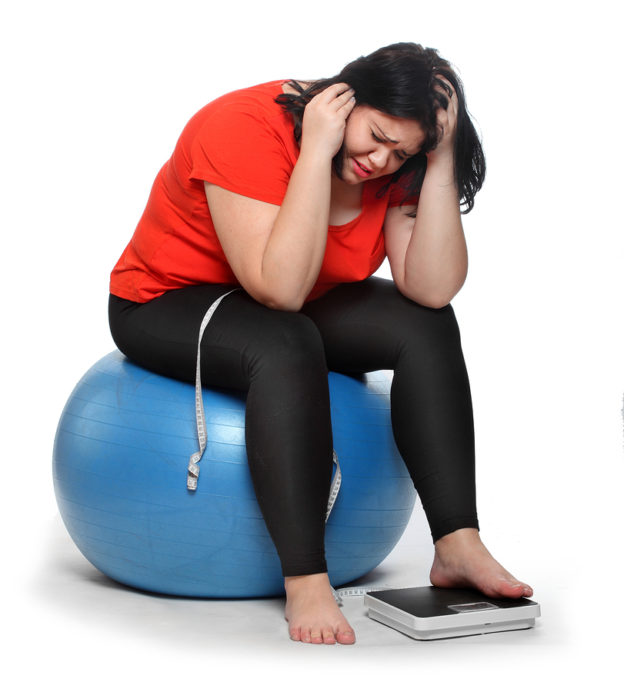By Bonnie Jenkins, Advanced Natural Medicine
‘Tis the season – for resolutions, that is. And, whether it’s to quit smoking, get organized or become debt-free, most of us will have abandoned our worthy goals before the end of January. But if you are among the one in four Americans vowing to lose weight in 2008, here’s some news that may provide extra incentive:
It seems that diet is second only to smoking as a major cause of avoidable cancer!
According to an international report by the American Institute for Cancer Research, about one-third of the world’s cancers could be avoided if everyone ate better, exercised more and weighed less. This new report is based on a five-year study involving nine teams of scientists from around the world and 21 international experts who analyzed more than 7,000 large-scale studies. It’s the most comprehensive look ever at the evidence linking cancer to diet, physical activity and weight.
Shed Those Pounds
The report puts special emphasis on weight – particularly around the waist – and its impact on several kinds of cancer. In fact, being overweight or obese significantly increases the risk of postmenopausal breast cancer, and cancers of the colon, pancreas, kidney, endometrium and esophagus.
There are several likely reasons why excess weight increases risk, but the report highlights cancer-promoting hormones (estrogen, androgen and progesterone), growth factors (insulin, insulin-like growth factors and leptin) and inflammatory markers (C-reactive protein, tumor necrosis factor and interleukin-6), which are all elevated in people who are obese. Being overweight also increases insulin resistance, which itself a risk factor for endometrial and colon cancer, and possibly cancers of the pancreas and kidney. The good news is that the risk for all of these cancers decreases as you shed the pounds.
Get Moving
One major reason we pack on the pounds is because we’ve become a nation of couch potatoes. Yet all kinds of physical activity protect against colon cancer – and quite possibly postmenopausal breast cancer and endometrial cancer, too. Why? According to the report, active people have healthier levels of circulating hormones and are less likely to gain weight.
Open your arteries, improve blood flow for a new health miracle...
Did you know your circulatory system has over 60,000 miles of arteries, veins and other blood vessels, if stretched end to end?
But as you age, your blood vessels undergo changes, which may cause them to stiffen, thicken and get clogged.
GOOD NEWS! Doctors have now identified a “Miracle Molecule” inside your arteries that helps OPEN your arteries and IMPROVE blood flow.
It’s what Dr. Valentin Fuster calls it, "One of the most important discoveries in the history of cardiovascular medicine."To you, that means...
- Healthy blood pressure
- Sharper mind and memory
- Skyrocketing energy and muscular strength
- Increased pleasure and passion in the bedroom
- Improved circulation to every cell and organ in your body
Go here to discover a new natural way to significantly boost the levels of this miracle molecule in YOUR body NOW!
Humans aren’t genetically wired to be as sedentary as we are today. Until the dawn of the 20th century, people have generally worked hard to scratch out a living – and most of that work came in the form of physical labor. But between our desk jobs, drive thrus and remote controls, we have to make the time and effort to exercise.
That doesn’t mean you have to train for a marathon. Physical activity equivalent to brisk walking for at least 30 minutes every day will do the trick. As fitness improves, aim for 60 minutes or more of moderate, or 30 minutes or more of vigorous, physical activity every day. And try to limit sedentary habits like watching T.V., which is often accompanied by high-calorie snacking.
Get Specific
Along with our sedentary lifestyle, the report places the blame for our burgeoning waistlines squarely on the excessive consumption of sugary beverages and calorie-dense foods high in fat and sugar. Add to that the sad truth that we don’t eat nearly enough fruits and non-starchy vegetables.
To prevent becoming overweight, the experts advocate a mostly plant-based diet. Plant foods seem to protect against cancers of the digestive tract, lung and prostate by boosting antioxidant levels along with dietary fiber. Plant-based diets have also long been linked to less risk of becoming overweight, which offers further cancer protection. Aim for at least five servings of fruits and vegetables daily. Getting two servings in by lunchtime will increase your odds of hitting this goal by day’s end.
The report also throws up a caution flag on meat since a high intake of red and processed meats – hot dogs, lunch meat and meats preserved by smoking – increases the risk of colorectal cancer. These foods are often high in fat, but other factors likely contribute to the link, specifically iron, nitrates, ammonia and heterocyclic amines formed by cooking meat at high temperatures. And while the report recommends no more than 18 ounces of red and processed meat per week (approximately 4.5 four ounce servings), it’s even better if you can limit your intake to just two or three servings per week.
Are You Suffering From...
- Love handles and a pot belly
- Romance that isn't what it used to
- Forgetfulness and inattention
- Low (or no) strength and endurance
- A sex drive that's shifted into neutral...or worse
If so...you may have Mature Male Burnout. Click here to discover more about this unique condition and what you can do about it.
Salt is another culprit because of its link to stomach cancer – not to mention its role in hypertension. Try to limit your sodium intake to a total of 2,400 mg. a day at most (the average American gets 4,000 to 5,000 mg. per day). Avoiding soft drinks, limiting the intake of high-calorie foods and processed fast foods not only save you calories, they are notoriously high in sodium. Other hidden sources of sodium include canned soups, salad dressing, commercial bread, canned fish and vegetables, and cheeses.
As you clean up your diet, make weight loss a priority. If you’re overweight, start making small changes to lose weight: exercise, avoid sugary drinks and significantly limit calorie-rich foods like fast foods and other foods high in fat and sugar. You’ll not only guard against cancer, you’ll look and feel better too!
One Last Thing …
Bad habits also contribute to increasing your risk of avoidable cancers. If you drink alcohol, do so cautiously since alcohol has been linked to cancers of the mouth, pharynx, larynx, esophagus, colon/rectum (in men) and breast. But given that other evidence links moderate alcohol consumption to a reduced risk of cardiovascular disease, the experts recommend limiting alcohol to no more than two drinks a day for men and one for women. (One “drink” is a 12-ounce beer, five ounces of wine or 1.5 ounces of spirits.) Cheers!
This Just In …
Lately I’ve been getting e-mails from subscribers taking cholesterol-lowering medications. Their concern? Recent reports that consuming grapefruit and grapefruit juice can adversely interact with statin drugs.
Some statins, like Mevacor (lovastatin), Zocor (simvastatin) and Lipitor (atorvastatin), do indeed interact with this tart citrus fruit. As a result, grapefruit can potentially increase the risk of side effects. That’s why the drugs usually come with warnings not to eat grapefruit or drink grapefruit juice.
The problem occurs because grapefruit contains a chemical that inactivates a liver enzyme involved in drug metabolism. As a result, regular consumption of grapefruit juice can lead to excessively high levels of statins in the blood and boost the risk of liver damage and severe muscle weakness.
That said, researchers at Hebrew University in Jerusalem are investigating whether taking a statin along with grapefruit juice could allow for lower doses of these potentially harmful drugs. The scientists divided 57 men and women who had recently undergone coronary bypass surgery and whose blood cholesterol remained high despite treatment with statin drugs into three groups. One group ate a single serving of red grapefruit every day; another ate a serving of white grapefruit and the third group had none. At the end of 30 days, the researchers found that the grapefruit eaters – especially those eating red grapefruit – had significant decreases in cholesterol, while the abstainers did not.
This combo might also have the potential to treat stubbornly high cholesterol levels. But don’t try this at home! Combining grapefruit and statins to lower cholesterol levels is an experimental remedy that should be only done under close medical supervision.
Of course, statin drugs shouldn’t be taken lightly. In fact, it should only be used as a last resort. If your cholesterol is just slightly on the high side, opt for natural ways to reduce your total and LDL (bad) cholesterol levels like fish oil supplements or non-flushing niacin. You might also talk to your doctor about red yeast rice – a compound that acts like a natural statin. An added benefit – a study at UCLA recently discovered that red yeast rice also inhibits colon cancer growth.
Plus, following the dietary advice outlined above won’t just cut your cancer risk and help to keep you lean and mean – a plant-based diet combined with exercise can also slash your cholesterol levels!
So what are you waiting for? Using these tips as a starting point, begin making small changes that can add up to a healthier lifestyle. It’s not as hard as you think – and you might even make 2008 your best year yet!
References:
Dahan A, Altman H. “Food-drug interaction: grapefruit juice augments drug bioavailability–mechanism, extent and relevance.” European Journal of Clinical Nutrition. 2004;58:1-9.
De Castro WV, Mertens-Talcott S, Rubner A. et al. “Variation of Flavonoids and Furanocoumarins in Grapefruit Juices: A Potential Source of Variability in Grapefruit Juice-Drug Interaction Studies.” Journal of Agriculture and Food Chemistry. 2006; 54: 249-255.
Hong MY, Seeram NP, Zhang Y, et al. “Anticancer effects of Chinese red yeast rice versus monacolin K alone on colon cancer cells.” The Journal of Nutritional Biochemistry. Available online 14 September 2007.
World Cancer Research Fund/American Institute for Cancer Research. Food, Nutrition, Physical Activity and the Prevention of Cancer: A Global Perspective. Washington D.C. AICR 2007.



